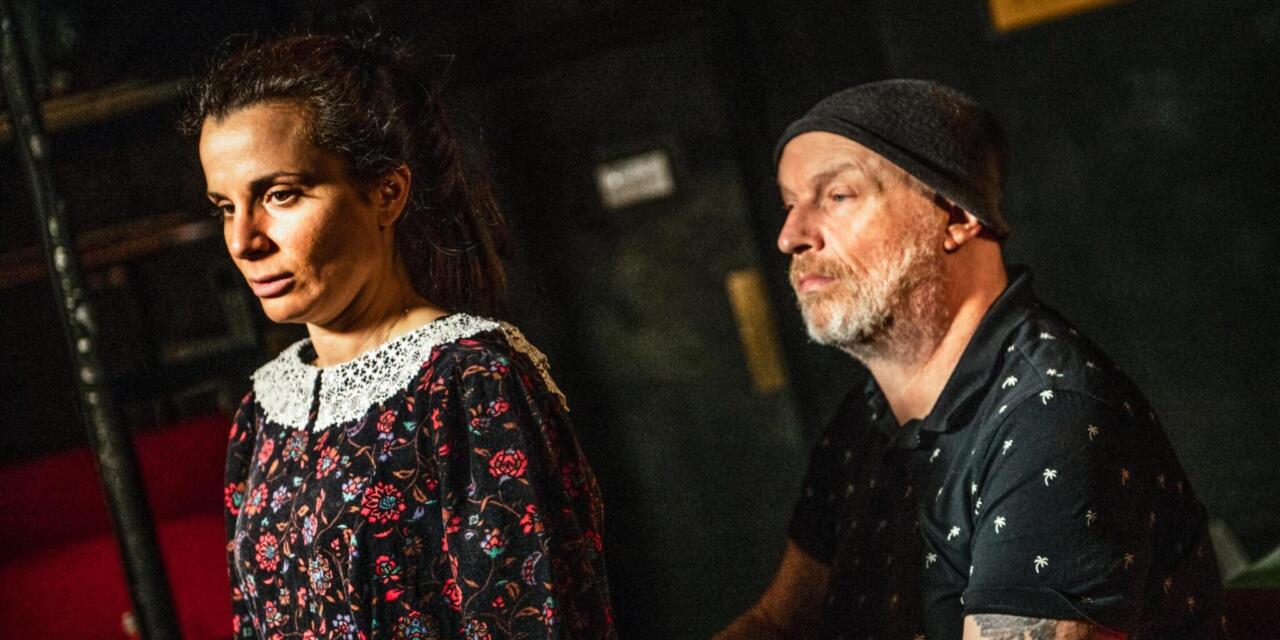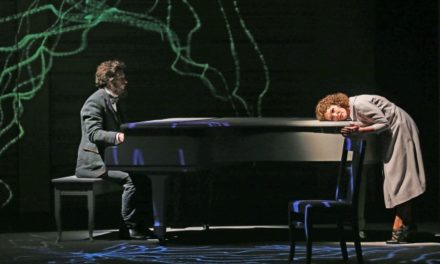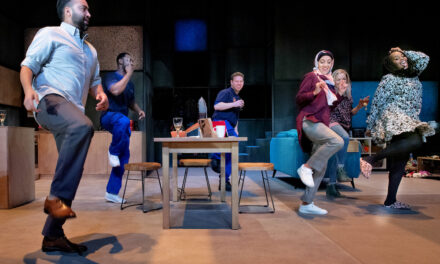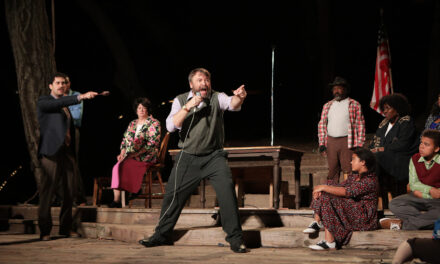Konrad: Hello, I’m Konrad. I’m here to share an account of the production of Mark Ravenhill’s The Haunting of Susan A. I saw it on the 11th of June 2022 at The King’s Head Theatre – perhaps best described as an atmospheric, cramped, shabby, thrust stage auditorium. It’s located at the back of a pub on Upper Street in London’s borough of Islington.
Before I begin I should stipulate that I decided to touch upon how deeply emotional this experience was for me. I would also like to mention my personal story in relation to this playwright.
The Inner Critic: But you are writing about Mark Ravenhill, an internationally acclaimed playwriting legend and now Artistic Director and joint CEO of that theatre, surely your focus should be on him? This should be an (as) objective (as possible) account and evaluation of the production, anyone who reads it will do it to learn about Ravenhill’s latest piece, not about you.
Konrad: Ok, before we get into that, I appreciate that Mark Ravenhill is the playwright and that he also appears in the production, but it should be mentioned that Suzanne Ahmet who joins (or – for the most part – displaces?) him on stage gives a powerful, accomplished performance. She tricks the audience with such skill that even Hamlet wouldn’t realise he’s being played like a flute.
Still, the reason I want to talk about myself is that in this particular case I feel that my story is somehow Ravenhill’s story and that possibly it might illustrate something about the power of playwriting and theatre.
It was in Łódź in Poland, maybe sometime in 2003, maybe it was 2004 – I was in still in high school and I went to see a production of Some Explicit Polaroids at one of the local theatres. At the time I was trying to work out – or battle – my sexuality, suppress my queerness, and this play tore through all my defences. For the first time in my life, I saw a part of my identity on stage and I stopped being afraid of it. It was exactly the kind of theatre I wanted to see more of and to a large extent set me on a path where just under twenty years later I live in the UK and spend a lot of my time outside of my day job devouring plays, translating them and/or writing about them.
The Inner Critic: Well that’s all very sweet, though you seem to be glossing over the fact that Some Explicit Polaroids isn’t exactly a celebratory coming out story. Nor is, for that matter, The Haunting of Susan A.
Konrad: No, but they are both plays about identity and politics. In the case of the latter, to a large extent, it’s about the identity of spaces, of audiences and readers, of storytellers – and of the politics involved in the dynamics between them.
This piece is inherently linked with the space it’s performed in. A character named Mark Ravenhill (played by Mark Ravenhill) takes to the – pretty bare – stage to tell the story of the venue that’s celebrating half a century of theatremaking, and that’s soon to move to a new home. Of a venue that, before becoming a theatre, would house boxing matches. The past of the venue, the stories seem to suggest, maintains a ghostly presence throughout the site’s history and has haunted London’s locally residing prominent theatre figures even before its inception as a ground for thesps. But as soon as Mark points to this past he undermines it, saying it might well have never been a site of bloodsports.
This is where a character named Susan (played by Suzanne Ahmet) intervenes – emerging out from the audience – to evoke the ghosts of the past residing within the space, contest Mark’s narrative and propose one of her own. It seems to be a story of her own journey towards becoming an actor, intriguingly meditative and full of metatheatrical insights conveyed both through the quality of the narrative and through cleverly scripted moments of audience interaction. Additional trickery in Roly Botha’s sound and Jo Underwood’s lighting design add to the atmosphere through jump-scares, generating genuine confusion as to the nature and fabric of events unfolding onstage.
Whenever Mark tries to intervene to reclaim the narrative, take back his space centre-stage and steer the performance towards a story he appears to have intended it to be, spirits seem to stifle him. Susan and her ghosts keep digging to unearth a trauma that Mark is working to suppress. Their interaction takes the form of a conflict over the identity of the space they both occupy. With identity politics being at the centre of British life for more than a decade – and lying at the core of events such as the EU exit, the Black Lives Matter movement, bullying and harassment within the arts; or more globally serving as a Russia’s declared reason for their aggression on Ukraine – Ravenhill’s new play subtly and intricately touches on the nerves of processes that define the world today. And it does all of that in a cramped, shabby little auditorium on the back of a theatre pub in Islington.
The Inner Critic: See that wasn’t so bad, doesn’t a review sound so much better when you take the critic’s persona out of it and focus on the show?
Konrad: Perhaps. I’m still only giving a personal account of one matinee performance though. A rather special one at that, as among the audience was a lady named Katherine (if I remembered correctly), who turned out to be a costume designer connected to the theatre’s past, and who enriched the afternoon through sharing her own memories of the space. How would you incorporate her account into a “neutral” account of the production?
What was particularly moving about that moment was how naturally Ravenhill invited her into the space of this performance, allowing her to be heard and seen by others and trusted her to add value to a story he intended to tell. In doing that, the author reminded me that being seen and being heard is what theatre’s all about. Just like he first showed it to me nearly twenty years ago, in Poland. Wouldn’t you agree? Hello? Are you still there? Where did you go?
The Haunting of Susan A
Written by Mark Ravenhill
Performed by Suzanne Ahmet and Mark Ravenhill
Associate Director: Iman Qureshi
Design by Simon Fraser
Sound Design by Roly Botha
Lighting Design by Jo Underwood
The King’s Head Theatre, London, 1-26 June 2022
Seen on 11 June 2022
This post was written by the author in their personal capacity.The opinions expressed in this article are the author’s own and do not reflect the view of The Theatre Times, their staff or collaborators.
This post was written by Konrad Zielinski.
The views expressed here belong to the author and do not necessarily reflect our views and opinions.


















